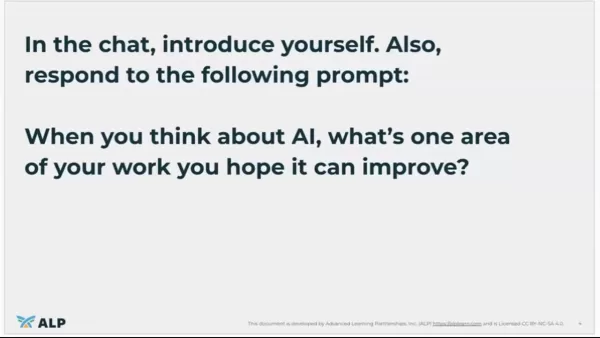GenAI for Rubric Design: Revolutionizing Education in 2025
The Transformative Impact of Generative AI on Education in 2025
In the ever-evolving world of education, Generative AI (GenAI) stands out as a game-changer by 2025. It's not just a buzzword but a technology that's reshaping how we approach teaching and learning, particularly in the realm of rubric design. This article explores how GenAI can help educators craft more effective and equitable assessment tools, ultimately enriching the educational journey for students. As we delve into this new frontier, it's crucial to grasp both the potential and the implications of integrating GenAI into rubric design and application, with a focus on practical, actionable tools.
Key Points
- GenAI tools, such as ChatGPT, are transforming the creation and use of rubrics in education.
- This webinar highlights the practical applications of GenAI in designing effective rubrics.
- Advanced Learning Partnerships (ALP) and OECM are working together to bring GenAI to educators.
- Understanding the varied uses of AI tools can significantly improve teaching and learning processes.
- The emphasis is on equipping educators with practical tools and insights for rubric design.
The Dawn of GenAI in Education
What is Generative AI?
Generative AI encompasses a range of AI algorithms that can create new content, from text to images and beyond. In education, GenAI can be a powerhouse, aiding in everything from lesson planning to content creation and, importantly, rubric design. By tapping into AI, educators can streamline their workflows, allowing them to devote more time to what truly matters: nurturing student growth.
GenAI uses sophisticated algorithms and extensive datasets to detect patterns and relationships in data, enabling it to produce fresh content that meets specific criteria. The possibilities for education are endless, opening doors to personalized learning, automation, and heightened student engagement.
With GenAI, the days of relying solely on manual content creation are fading. Educators can now amplify their creativity and efficiency, resulting in richer, more dynamic learning experiences. AI-powered tools can liberate teachers to focus more on individual student needs and innovative teaching methods.
Introducing the Facilitator: Eric White
Eric White's Background and Expertise
Eric White, a consultant with Advanced Learning Partnerships (ALP), brings a wealth of experience to the table. As a former teacher, instructional coach, and independent consultant, Eric's forte is leveraging technology to enhance educational practices. The partnership between ALP and the Ohio Education and Management Council (OECM) demonstrates a strong commitment to providing educators with cutting-edge tools.
Eric's journey with GenAI began in December 2022 when he first experimented with ChatGPT. This turning point ignited his passion for exploring how AI could revolutionize education.

Since then, Eric has been a vocal advocate, sharing his insights on integrating GenAI into educational settings. His enthusiasm and practical experience make him an invaluable resource for educators looking to navigate this emerging landscape. With Eric's guidance, teachers can confidently harness AI to create more engaging and effective learning experiences.
Getting Started with GenAI for Rubric Design
A Prompt to Ignite the Discussion
Let's start with a question: 'When you think about AI, what’s one area of your work you hope it can improve?' This prompt encourages educators to pinpoint their challenges and envision how AI could offer solutions. Sharing these reflections in the chat fosters a collaborative environment for brainstorming and collective learning.
By engaging with this question, educators can identify specific hurdles in their teaching practices. Articulating these challenges is the first step toward exploring how GenAI tools might provide practical answers. This reflective process is essential for fostering a culture of innovation and continuous improvement.
Moreover, sharing these insights in a collaborative setting builds a community of support. Educators can draw inspiration from each other's experiences and discover new ways to leverage AI, enhancing their teaching methods. The chat becomes a vibrant space for exchanging ideas and developing a shared understanding of GenAI's potential in education.
Weighing the Advantages and Disadvantages of GenAI for Rubrics
Pros
- Increased Efficiency: GenAI can automate rubric creation, saving educators time and effort.
- Enhanced Objectivity: AI algorithms can help minimize bias in assessments by offering a consistent, data-driven approach to rubric design.
- Personalized Learning: GenAI can generate rubrics tailored to specific learning goals and individual student needs.
- Data-Driven Insights: AI can offer data-driven insights to enhance the effectiveness of rubrics and assessment practices.
- Improved Accessibility: GenAI can make rubric design more accessible to educators with limited experience or training.
Cons
- Potential for Bias: AI algorithms may perpetuate existing biases if not properly trained and audited.
- Data Privacy and Security: Using student data in AI-powered rubric design raises concerns about privacy and security.
- Lack of Human Oversight: Over-reliance on AI can diminish human judgment and critical thinking in the assessment process.
- Dependence on Technology: Technical issues or outages can disrupt rubric design and affect assessment practices.
- Ethical Considerations: The use of AI in education brings up ethical questions about fairness, transparency, and accountability.
Frequently Asked Questions About GenAI in Rubric Design
What are the key benefits of using GenAI in rubric design?
GenAI brings several benefits to the table, including boosted efficiency, greater objectivity, and the ability to create rubrics tailored to specific learning objectives. It can also help identify potential biases and promote fairness in assessments.
What are some potential challenges of using GenAI in rubric design?
Challenges include the need for careful AI model training, ensuring data privacy and security, and addressing potential biases in algorithms. Maintaining human oversight and critical judgment in the rubric design process is also crucial.
How can educators ensure the responsible and ethical use of GenAI in rubric design?
Educators should prioritize transparency, fairness, and accountability when using GenAI. This involves selecting and training AI models carefully, regularly auditing algorithms for bias, and involving human experts in the rubric design process.
Related Questions About AI in Education
How will AI change education?
AI holds the promise of personalizing learning experiences, automating administrative tasks, and providing data-driven insights to improve teaching practices. It has the potential to revolutionize education by making it more accessible, effective, and engaging for students.
What skills will students need to succeed in an AI-driven world?
Students will need to cultivate critical thinking, problem-solving, creativity, and collaboration skills. They must also be adaptable and committed to lifelong learning to navigate the ever-changing technological landscape.
What role will teachers play in an AI-driven classroom?
Teachers will remain essential as facilitators of learning, mentors, and guides. They will need to acquire new skills in curriculum design, data analysis, and the ethical use of AI to effectively support student learning.
Related article
 AI Reimagines Michael Jackson in the Metaverse with Stunning Digital Transformations
Artificial intelligence is fundamentally reshaping our understanding of creativity, entertainment, and cultural legacy. This exploration into AI-generated interpretations of Michael Jackson reveals how cutting-edge technology can breathe new life int
AI Reimagines Michael Jackson in the Metaverse with Stunning Digital Transformations
Artificial intelligence is fundamentally reshaping our understanding of creativity, entertainment, and cultural legacy. This exploration into AI-generated interpretations of Michael Jackson reveals how cutting-edge technology can breathe new life int
 Does Training Mitigate AI-Induced Cognitive Offloading Effects?
A recent investigative piece on Unite.ai titled 'ChatGPT Might Be Draining Your Brain: Cognitive Debt in the AI Era' shed light on concerning research from MIT. Journalist Alex McFarland detailed compelling evidence of how excessive AI dependency can
Does Training Mitigate AI-Induced Cognitive Offloading Effects?
A recent investigative piece on Unite.ai titled 'ChatGPT Might Be Draining Your Brain: Cognitive Debt in the AI Era' shed light on concerning research from MIT. Journalist Alex McFarland detailed compelling evidence of how excessive AI dependency can
 Easily Generate AI-Powered Graphs and Visualizations for Better Data Insights
Modern data analysis demands intuitive visualization of complex information. AI-powered graph generation solutions have emerged as indispensable assets, revolutionizing how professionals transform raw data into compelling visual stories. These intell
Comments (9)
0/200
Easily Generate AI-Powered Graphs and Visualizations for Better Data Insights
Modern data analysis demands intuitive visualization of complex information. AI-powered graph generation solutions have emerged as indispensable assets, revolutionizing how professionals transform raw data into compelling visual stories. These intell
Comments (9)
0/200
![WyattHill]() WyattHill
WyattHill
 September 29, 2025 at 6:30:35 AM EDT
September 29, 2025 at 6:30:35 AM EDT
Isso parece promissor, mas também me pergunto se os professores serão substituídos por IA lá na frente. Já imaginou ter que explicar pro seu chefe que você foi demitido por um algoritmo? 😅 #medodosrobos


 0
0
![RaymondWalker]() RaymondWalker
RaymondWalker
 August 26, 2025 at 7:01:20 PM EDT
August 26, 2025 at 7:01:20 PM EDT
¡Qué pasada! La IA generativa está cambiando la educación en 2025, pero ¿no crees que depender tanto de la tecnología puede hacer que los profes pierdan su toque personal? 😅


 0
0
![PeterThomas]() PeterThomas
PeterThomas
 August 11, 2025 at 2:01:05 PM EDT
August 11, 2025 at 2:01:05 PM EDT
This AI rubric design stuff is wild! It's like having a super-smart teacher’s aide who never sleeps. Curious how it’ll handle grading biases though—could it make things fairer or just amplify existing issues? 🤔


 0
0
![ThomasHernández]() ThomasHernández
ThomasHernández
 May 13, 2025 at 10:23:06 PM EDT
May 13, 2025 at 10:23:06 PM EDT
Wow, GenAI in education sounds like a game-changer! Designing rubrics with AI could save teachers so much time. Curious how it handles subjective grading though 🤔


 0
0
![JuanLewis]() JuanLewis
JuanLewis
 May 13, 2025 at 8:25:11 PM EDT
May 13, 2025 at 8:25:11 PM EDT
Генеративный ИИ в образовании — это что-то! К 2025 году рубрики будет делать ИИ, звучит круто, но я волнуюсь, не потеряется ли индивидуальность в оценках? 🤨


 0
0
![WalterWhite]() WalterWhite
WalterWhite
 May 13, 2025 at 7:56:18 AM EDT
May 13, 2025 at 7:56:18 AM EDT
教育にGenAI?めっちゃ面白そう!ルーブリック作成が楽になるなんて、教師の負担減りそう。でも、AIに人間の感性はどこまでわかるかな?😅


 0
0
The Transformative Impact of Generative AI on Education in 2025
In the ever-evolving world of education, Generative AI (GenAI) stands out as a game-changer by 2025. It's not just a buzzword but a technology that's reshaping how we approach teaching and learning, particularly in the realm of rubric design. This article explores how GenAI can help educators craft more effective and equitable assessment tools, ultimately enriching the educational journey for students. As we delve into this new frontier, it's crucial to grasp both the potential and the implications of integrating GenAI into rubric design and application, with a focus on practical, actionable tools.
Key Points
- GenAI tools, such as ChatGPT, are transforming the creation and use of rubrics in education.
- This webinar highlights the practical applications of GenAI in designing effective rubrics.
- Advanced Learning Partnerships (ALP) and OECM are working together to bring GenAI to educators.
- Understanding the varied uses of AI tools can significantly improve teaching and learning processes.
- The emphasis is on equipping educators with practical tools and insights for rubric design.
The Dawn of GenAI in Education
What is Generative AI?
Generative AI encompasses a range of AI algorithms that can create new content, from text to images and beyond. In education, GenAI can be a powerhouse, aiding in everything from lesson planning to content creation and, importantly, rubric design. By tapping into AI, educators can streamline their workflows, allowing them to devote more time to what truly matters: nurturing student growth.
GenAI uses sophisticated algorithms and extensive datasets to detect patterns and relationships in data, enabling it to produce fresh content that meets specific criteria. The possibilities for education are endless, opening doors to personalized learning, automation, and heightened student engagement.
With GenAI, the days of relying solely on manual content creation are fading. Educators can now amplify their creativity and efficiency, resulting in richer, more dynamic learning experiences. AI-powered tools can liberate teachers to focus more on individual student needs and innovative teaching methods.
Introducing the Facilitator: Eric White
Eric White's Background and Expertise
Eric White, a consultant with Advanced Learning Partnerships (ALP), brings a wealth of experience to the table. As a former teacher, instructional coach, and independent consultant, Eric's forte is leveraging technology to enhance educational practices. The partnership between ALP and the Ohio Education and Management Council (OECM) demonstrates a strong commitment to providing educators with cutting-edge tools.
Eric's journey with GenAI began in December 2022 when he first experimented with ChatGPT. This turning point ignited his passion for exploring how AI could revolutionize education.

Since then, Eric has been a vocal advocate, sharing his insights on integrating GenAI into educational settings. His enthusiasm and practical experience make him an invaluable resource for educators looking to navigate this emerging landscape. With Eric's guidance, teachers can confidently harness AI to create more engaging and effective learning experiences.
Getting Started with GenAI for Rubric Design
A Prompt to Ignite the Discussion
Let's start with a question: 'When you think about AI, what’s one area of your work you hope it can improve?' This prompt encourages educators to pinpoint their challenges and envision how AI could offer solutions. Sharing these reflections in the chat fosters a collaborative environment for brainstorming and collective learning.
By engaging with this question, educators can identify specific hurdles in their teaching practices. Articulating these challenges is the first step toward exploring how GenAI tools might provide practical answers. This reflective process is essential for fostering a culture of innovation and continuous improvement.
Moreover, sharing these insights in a collaborative setting builds a community of support. Educators can draw inspiration from each other's experiences and discover new ways to leverage AI, enhancing their teaching methods. The chat becomes a vibrant space for exchanging ideas and developing a shared understanding of GenAI's potential in education.
Weighing the Advantages and Disadvantages of GenAI for Rubrics
Pros
- Increased Efficiency: GenAI can automate rubric creation, saving educators time and effort.
- Enhanced Objectivity: AI algorithms can help minimize bias in assessments by offering a consistent, data-driven approach to rubric design.
- Personalized Learning: GenAI can generate rubrics tailored to specific learning goals and individual student needs.
- Data-Driven Insights: AI can offer data-driven insights to enhance the effectiveness of rubrics and assessment practices.
- Improved Accessibility: GenAI can make rubric design more accessible to educators with limited experience or training.
Cons
- Potential for Bias: AI algorithms may perpetuate existing biases if not properly trained and audited.
- Data Privacy and Security: Using student data in AI-powered rubric design raises concerns about privacy and security.
- Lack of Human Oversight: Over-reliance on AI can diminish human judgment and critical thinking in the assessment process.
- Dependence on Technology: Technical issues or outages can disrupt rubric design and affect assessment practices.
- Ethical Considerations: The use of AI in education brings up ethical questions about fairness, transparency, and accountability.
Frequently Asked Questions About GenAI in Rubric Design
What are the key benefits of using GenAI in rubric design?
GenAI brings several benefits to the table, including boosted efficiency, greater objectivity, and the ability to create rubrics tailored to specific learning objectives. It can also help identify potential biases and promote fairness in assessments.
What are some potential challenges of using GenAI in rubric design?
Challenges include the need for careful AI model training, ensuring data privacy and security, and addressing potential biases in algorithms. Maintaining human oversight and critical judgment in the rubric design process is also crucial.
How can educators ensure the responsible and ethical use of GenAI in rubric design?
Educators should prioritize transparency, fairness, and accountability when using GenAI. This involves selecting and training AI models carefully, regularly auditing algorithms for bias, and involving human experts in the rubric design process.
Related Questions About AI in Education
How will AI change education?
AI holds the promise of personalizing learning experiences, automating administrative tasks, and providing data-driven insights to improve teaching practices. It has the potential to revolutionize education by making it more accessible, effective, and engaging for students.
What skills will students need to succeed in an AI-driven world?
Students will need to cultivate critical thinking, problem-solving, creativity, and collaboration skills. They must also be adaptable and committed to lifelong learning to navigate the ever-changing technological landscape.
What role will teachers play in an AI-driven classroom?
Teachers will remain essential as facilitators of learning, mentors, and guides. They will need to acquire new skills in curriculum design, data analysis, and the ethical use of AI to effectively support student learning.
 AI Reimagines Michael Jackson in the Metaverse with Stunning Digital Transformations
Artificial intelligence is fundamentally reshaping our understanding of creativity, entertainment, and cultural legacy. This exploration into AI-generated interpretations of Michael Jackson reveals how cutting-edge technology can breathe new life int
AI Reimagines Michael Jackson in the Metaverse with Stunning Digital Transformations
Artificial intelligence is fundamentally reshaping our understanding of creativity, entertainment, and cultural legacy. This exploration into AI-generated interpretations of Michael Jackson reveals how cutting-edge technology can breathe new life int
 Does Training Mitigate AI-Induced Cognitive Offloading Effects?
A recent investigative piece on Unite.ai titled 'ChatGPT Might Be Draining Your Brain: Cognitive Debt in the AI Era' shed light on concerning research from MIT. Journalist Alex McFarland detailed compelling evidence of how excessive AI dependency can
Does Training Mitigate AI-Induced Cognitive Offloading Effects?
A recent investigative piece on Unite.ai titled 'ChatGPT Might Be Draining Your Brain: Cognitive Debt in the AI Era' shed light on concerning research from MIT. Journalist Alex McFarland detailed compelling evidence of how excessive AI dependency can
 Easily Generate AI-Powered Graphs and Visualizations for Better Data Insights
Modern data analysis demands intuitive visualization of complex information. AI-powered graph generation solutions have emerged as indispensable assets, revolutionizing how professionals transform raw data into compelling visual stories. These intell
Easily Generate AI-Powered Graphs and Visualizations for Better Data Insights
Modern data analysis demands intuitive visualization of complex information. AI-powered graph generation solutions have emerged as indispensable assets, revolutionizing how professionals transform raw data into compelling visual stories. These intell
 September 29, 2025 at 6:30:35 AM EDT
September 29, 2025 at 6:30:35 AM EDT
Isso parece promissor, mas também me pergunto se os professores serão substituídos por IA lá na frente. Já imaginou ter que explicar pro seu chefe que você foi demitido por um algoritmo? 😅 #medodosrobos


 0
0
 August 26, 2025 at 7:01:20 PM EDT
August 26, 2025 at 7:01:20 PM EDT
¡Qué pasada! La IA generativa está cambiando la educación en 2025, pero ¿no crees que depender tanto de la tecnología puede hacer que los profes pierdan su toque personal? 😅


 0
0
 August 11, 2025 at 2:01:05 PM EDT
August 11, 2025 at 2:01:05 PM EDT
This AI rubric design stuff is wild! It's like having a super-smart teacher’s aide who never sleeps. Curious how it’ll handle grading biases though—could it make things fairer or just amplify existing issues? 🤔


 0
0
 May 13, 2025 at 10:23:06 PM EDT
May 13, 2025 at 10:23:06 PM EDT
Wow, GenAI in education sounds like a game-changer! Designing rubrics with AI could save teachers so much time. Curious how it handles subjective grading though 🤔


 0
0
 May 13, 2025 at 8:25:11 PM EDT
May 13, 2025 at 8:25:11 PM EDT
Генеративный ИИ в образовании — это что-то! К 2025 году рубрики будет делать ИИ, звучит круто, но я волнуюсь, не потеряется ли индивидуальность в оценках? 🤨


 0
0
 May 13, 2025 at 7:56:18 AM EDT
May 13, 2025 at 7:56:18 AM EDT
教育にGenAI?めっちゃ面白そう!ルーブリック作成が楽になるなんて、教師の負担減りそう。でも、AIに人間の感性はどこまでわかるかな?😅


 0
0





























